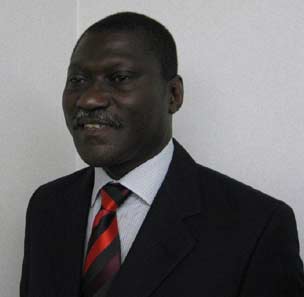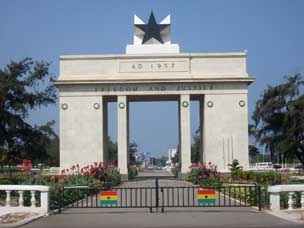AFRICAN HEADS
of State and Governments
ECONOMIC COMMUNITIES & AFRICA REGIONAL BODIES:
JAPAN AFRICA NETWORK'S TOP 10 DESTINATIONS:
- Serengeti National Park (the great migration), Tanzania
- Kruger National Park, South Africa
- Pyramids, Giza Egypt
- Rift Valley Lakes, Kenya.
- Kalahari Desert, Botswana
- Karnak Temple, Egypt
- Table Mountain, S. A.
- Atlas Mountain, Algeria
- Djoudj National Park, Senegal
- Goree Island, Senegal
CONTACT US: E-Mail!
Our Country of the Month of March 2010 is Ghana.
Happy 53rd Independence celebration to Ghana, our African Country of the Month; March 2010.
Known as the first place in sub-sahara Africa where the Europeans first arrived to trade in gold and later slave, it was subsequently colonized. Osagyefo Dr. Kwame Nkrumah(and his compatroits), an African statesman and Pan Africanist with a dream of a united Africa fought for and attained independence for Ghana - a merger of the British colony: Gold coast and the Togoland Trust Territory.

H.E. MR. KWAME A. TENKORANG
Ghana’s Ambassador to Japan.
On 6 March 1957; Dr. Nkrumah raised the new Ghana's flag of red, gold(with the black star) and green to declared Ghana "free forever"; making Ghana the first sub-sahara African country to gain independence from a colonial power. As the first Prime Minister and later President, Dr. Nkrumah started the task of nation building and laid the foundation for good and qualitative education which has endured to this day. He was overthroned in a military coup in 1966, this started a period of military government in Ghana till the 1992 constitutional referendum which opened the way to multi-party democracy. Today Ghana is classified as a moderate state and a stable democracy which has successfully transferred power between one legitimately elected government to another twice in 2001 and 2009. Ghana is also well endowed with natural resources: gold, cocoa and most recently - oil which is expected to expand late this year 2010 and 2011.
MESSAGE FROM H.E. MR. KWAME A. TENKORANG, AMBASSADOR OF THE REPUBLIC OF GHANA TO JAPAN, ON THE OCCASION OF THE 53RD INDEPENDENCE DAY CELEBRATION
PROSPEROUS FUTURE ANCHORED ON A UNITED AND COMMON VISION
- Today marks the 53rd Anniversary of Ghana’s independence. On 6th March, 1957, Ghana became the first sub-saharan African nation to attain independence; a phenomenal development that later ushered in the period of the birth of nations on our continent. The celebration of our National Day this year happily coincides with the 50th Anniversary of the establishment of the Embassy of Ghana in Tokyo.
- Today also marks a very special day in the continuing excellent relations between Ghana and Japan, as the Crown Prince, His Royal Highness Naruhito emplanes for a ground-breaking royal visit to Ghana and Kenya. We wish His Royal Highness a safe trip to Ghana and wish to assure His Highness and the people of Japan that a warm welcome to Ghana is assured. We promise Him a taste of the proverbial warm Ghanaian hospitality and the world renowned friendliness of the Ghanaian people.
- On this momentous occasion, it gives me great honour and privilege to convey heartfelt greetings and deepest respect on behalf of the Government and People of Ghana to Their Imperial Majesties, Emperor Akihito and Empress Michiko, the entire members of the Imperial Family as well as to the Government and friendly people of Japan. May I also seize this unique opportunity to convey warm congratulations and sincere best wishes from the Government and People of Ghana to His Majesty Emperor Akihito on the occasion of the 20th Anniversary of His Majesty’s accession to the Throne.
- The 6th of March is the day Ghanaians the world over gather around to celebrate the uniqueness of our land, reflect on the legacies that our forebears bequeathed to us and rededicate ourselves to leaving a solid legacy for the generations after us.
- As Ghana commemorates this historic day, it is imperative that we appreciate the socio-political and economic challenges that the country had been through over the past 53 years of nationhood. These challenges notwithstanding, national events over the last eighteen years have amply demonstrated the determination and steadfastness of Ghanaians to chart a new path of prosperity for themselves.
- Ghana made a historic transition to multi-party democracy in 1992, and has since conducted five successive free and fair democratic elections which witnessed the peaceful transfer of power from one constitutionally elected Government to another. The last of these elections, held in December, 2008 which ushered in the new Government of the National Democratic Congress (NDC) under the leadership of Professor John Evans Atta Mills marked yet another defining moment in the nation’s journey towards consolidating her fledgling democracy. Today, the country’s democratic space continues to widen, underpinned by Rule of Law, respect for Fundamental Human Rights, Freedom of the Press and Association, an independent Judiciary and a vibrant Legislature.
- The policy agenda of the Ghana Government, as enunciated by President Mills on his assumption of office include, investment in people, job creation, development of infrastructure and the pursuit of an open, transparent and accountable Government. In the pursuit of social justice, the ruling Government has pledged to lay a firm foundation for a prosperous and better Ghana based on a consensus driven agenda where the contributions of every citizen would be deemed critical. The Government envisions a nation whose future prosperity is anchored on a united and common vision of the citizenry.
- Amidst the daunting development challenges, both domestic and external, that had confronted and continue to face the new administration, it is worthy to note that significant progress has been made in all areas of governance at the end of its first year in power. Ghana, like most African countries has not escaped the impact of the global economic downturn. Consequently, credit lines froze, trade finance diminished, foreign direct investment slowed down and remittances from overseas workers dwindled significantly. To minimize the effects of the financial crisis and work towards resuscitating the economy, the Government implemented a series of human-centred policies which have begun yielding dividends. The National Youth Employment Programme (NYEP), aimed at harnessing the extraordinary talent of the youth is opening up employment generation avenues in critical sectors such as agriculture. Furthermore, through the active support of the Government, local industries are expanding their range of activities.
- Continue - 53rd Independence Day Speech
- Country of the Month, December 2009 Kenya
- For more information on Kenya: Kenya
- Country of the month November: Angola
- Country of the month October: Nigeria

